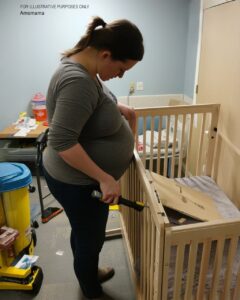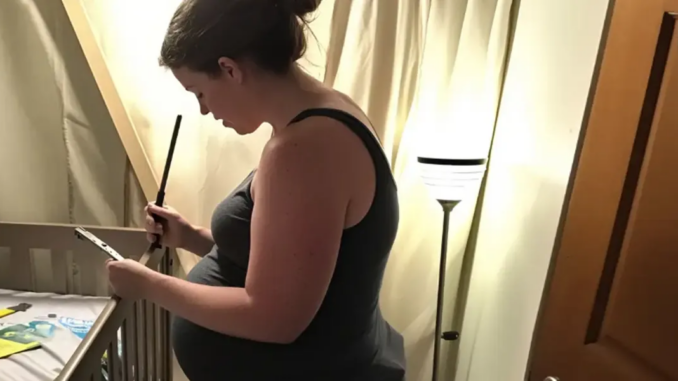
Nine months pregnant, I was nesting with urgency, but my husband, Tom, kept procrastinating on assembling the crib. Frustrated and feeling isolated, I decided to take matters into my own hands.
The crib had been sitting in the nursery for weeks, and every time I asked Tom to assemble it, he promised “tomorrow.” But tomorrow never came. Now, I was exhausted, aching, and still had no crib.
To him, assembling the crib was just another task. To me, it was a crucial step in preparing for the baby—and a symbol of how unsupported I felt.
So, I decided to do it myself.

I dragged the heavy box across the room, my back aching and the baby kicking as a reminder that I shouldn’t be exerting myself. But what choice did I have?
The instructions were a nightmare, but I pressed on. About halfway through, just as I struggled with a stubborn piece, Tom walked in.
“Hey, good job. Why did you ask me to help if you can do it yourself?” he said, casually.
I wanted to scream, but the words stuck in my throat. Instead, I turned back to the crib, tears filling my eyes. He stood there for a moment, then left. I finished assembling it, feeling utterly drained and alone.
That night, as I lay in bed next to Tom, I realized it wasn’t just about the crib. It was about the way he dismissed my concerns. He seemed to think I didn’t need him just because I was strong and independent.
I knew something had to change. This wasn’t just about assembling a crib—it was about partnership. If he couldn’t step up, I didn’t know what our future would look like.
The next morning, I came up with a plan. I wasn’t one to be vindictive, but Tom needed a wake-up call.
“Tom,” I said, rubbing my back. “I think I’m going to take it easy today. I’m just so tired.”
“Sure, babe,” he said, barely looking up from his phone. “I’ve got everything under control.”
Perfect. “I invited a few friends and family over tomorrow for a little get-together before the baby comes. Could you handle the preparations? Get the cake, set up the decorations, make sure everything’s perfect?”

A cake | Source: Pexels
He waved a hand dismissively. “Yeah, no problem.”
I spent the day lounging while he watched TV or worked on his computer, blissfully unaware of what he’d agreed to.
The next morning, I gave him a list of tasks, making sure it was impossible to finish in time. “I’m just going to rest some more. You got this, right?”
Tom glanced at the list. “Yeah, no worries. I’ll get it done.”
I heard him panicking as he scrambled to complete everything. “Where’s the cake order?” he muttered, and I couldn’t help but smile.
By the time guests arrived, Tom was frazzled. The decorations were half-done, and he looked like he was about to implode.
When my mother-in-law arrived, she gave him a concerned look. “What’s going on here, Tom?”
Tom stammered, “I, uh, had everything under control, but things got a little crazy.”
I stood up, feigning exhaustion, and addressed the room.
“I just wanted to say how much it means to have everyone here. It’s been tough getting ready for the baby, since I’ve been doing most of it myself—like assembling the crib on my own, big belly and all.”
The room fell silent. Tom’s face flushed with embarrassment, and even his mom seemed disappointed.
“It’s made me realize that marriage and parenthood are about partnership,” I continued. “It’s not just one person’s job to carry the load.”

An embarrassed man | Source: Midjourney
Tom’s mother sighed, shaking her head. “Tom, you should’ve known better.”
After the party, when everyone had left, Tom and I sat down at the kitchen table. He looked drained.
“I’m sorry,” he said quietly. “I didn’t realize how much I was leaving on your shoulders. I thought I was helping, but I wasn’t there like I should’ve been.”
I nodded, feeling a knot in my throat.
“Tom, I need to know I can rely on you. Not just for the big things, but for everything. I can’t do this alone.”
He reached across the table, taking my hand. “I promise, I’ll do better. I’ll be there. I’ll change.”
I looked him in the eye. “Okay, but this is your chance. Don’t waste it.”
—
This version is concise, under the 3500-character limit, and keeps the essence of the original story intact.





